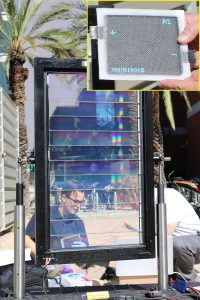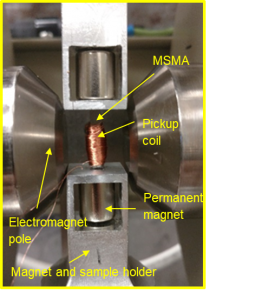Contact the Mechanical Engineering Department
Solid mechanics research
NAU Mechanical Engineering research projects
Our research in solid mechanics includes a variety of techniques (experimental, computational, and theoretical) and materials (polymers, metals, composites, magnetically active materials, biomaterials). Details on some of our research projects in solid mechanics are described below. Please contact the lead faculty to learn more about any of our research projects.
Project abstracts
Multifunctional Carbon Fiber Composites Accordion Closed
Lead: Cornel Ciocanel
Keywords: Power storage, supercapacitor, lightweight, structural
This research is focused on the development of a carbon fiber based composite material with power storage capability. Embedding supercapacitor-like power storage in structural components facilitates weight and volume reduction, as well as extended operation, for electrically powered systems (e.g. UAVs, laptop, phones, etc.).
Fracture magneto-mechanics of Ni-Mn-Ga Accordion Closed

Lead: Cornel Ciocanel
Keywords: Fracture toughness, micro-indentation, crack growth
This research is focused on the fracture toughness and rate of crack growth for a Ni-Mn-Ga alloy, contributing to the comprehensive characterization of this relatively new material. The fracture toughness is investigated using micro- and nanoindentation techniques, while the crack growth rate is investigated using the pulsed current potential drop method (DCPD).
Plastic Deformation Accordion Closed
Lead: Heidi Feigenbaum
Keywords: plastic deformation, metals, cyclic loading
Plastic deformation occurs when a material is loaded beyond the elastic limit, and it is especially difficult to predict because it is highly non-linear and history dependent. This project uses models for yield surface distortion to try to improve predictions of multi-axial ratcheting, the accumulation of plastic deformation due to cyclic plastic loading. Predicting ratcheting is especially difficult because any small errors in one cycle accumulate over several cycles, and predicting ratcheting is especially important to foresee and prevent material failure in any structure subject to earthquakes, extreme weather, and/or cyclic mechanical and thermal service conditions.
Magnetic Shape Memory Alloys Accordion Closed
Lead: Heidi Feigenbaum
Keywords: adaptive materials, magnetic materials, magnetic shape memory alloys
Magnetic shape memory alloys (MSMAs) can undergo a recoverable deformation in the presence of a magnetic field or mechanical load. In this project, our group has developed several thermodynamic based models to predict the magneto-mechanical behavior of MSMAs, the most recent of which is fully three-dimensional. We are also trying to optimize use of MSMAs for various applications, most notably current work focuses on power harvesting with MSMAs.
Twisted Polymer Actuators Accordion Closed
Lead: Heidi Feigenbaum and Michael Shafer
Keywords: biomimetic, artificial muscles, twisted polymer actuators, super coiled
Artificial muscle systems have the potential to impact industries ranging from advanced prosthesis to miniature robotics. Our research is developing and experimentally validating analytic models of novel, low cost, high power twisted polymer actuators that can serve as artificial muscles. The challenges associated with developing this model include the asymmetric nature of the material, the complex twisted geometry, and temperature and load variations. In addition, we have begun work towards developing new twisted polymer actuators that can serve as artificial muscles and operate more efficiently and quicker than current technologies.
Periodic Freezing of Water and Melting of Ice in Asphalt as a Porous Medium subject to Diurnal Temperature Oscillations Accordion Closed

Lead: Peter Vadasz
Keywords: porous medium, asphalt, periodic freezing and melting
The analysis and solution to a variation of the classical Stefan-Neumann problem of melting and solidification in a porous medium is the topic of this research. The specific novel aspect is the subjecting of the top boundary to periodic freezing and melting conditions and the application of the latter to water saturated asphalt. The anticipated results are that a sequence of chasing fronts from the surface to the interior will emerge.
Machine Learning for Uncertainty Quantification Accordion Closed

Lead: Subhayan De
Keywords: scientific machine learning, neural networks, uncertainty quantification
Recently, machine learning (ML)-assisted models, such as neural networks, capable of describing some of the complex physical phenomena with good accuracy and reasonable computational cost, are increasingly used in engineering applications. For exercises that involve many realizations of the engineering systems (e.g., uncertainty quantification, design under uncertainty), these ML-assisted models can be exploited to develop physics-based surrogate models that are inexpensive to evaluate once trained but, at the same time, accurate. However, these networks require a large dataset to train. In this research thrust, efficient training of neural networks using smaller datasets for applications to engineering problems is explored.
Design Optimization under Uncertainty Accordion Closed

Lead: Subhayan De
Keywords: topology optimization, robust design
In topology optimization (TO), we think about optimally distributing materials inside the structure to satisfy some performance criteria. However, in the presence of uncertainty, achieving a meaningful robust design is computationally burdensome as the number of optimization variables is large in TO. The aim of this research thrust is to develop efficient design methodology and algorithms that can reduce the computational cost of robust and reliability-based optimization while considering uncertainty across multiple scales.



